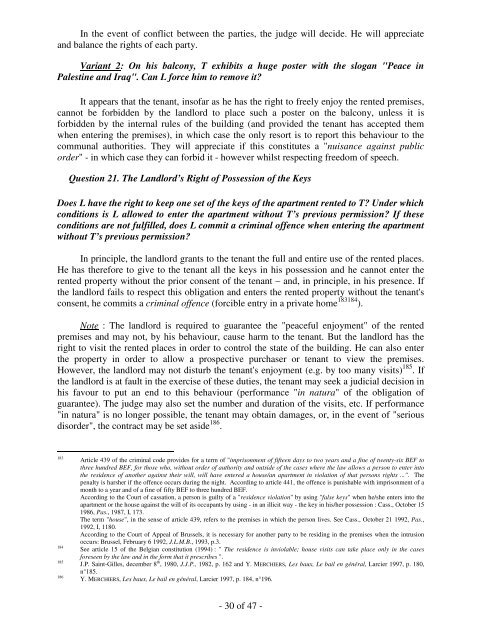- 1 of 47 - BELGIUM Catherine DELFORGE and Ludivine ...
- 1 of 47 - BELGIUM Catherine DELFORGE and Ludivine ...
- 1 of 47 - BELGIUM Catherine DELFORGE and Ludivine ...
You also want an ePaper? Increase the reach of your titles
YUMPU automatically turns print PDFs into web optimized ePapers that Google loves.
In the event <strong>of</strong> conflict between the parties, the judge will decide. He will appreciate<br />
<strong>and</strong> balance the rights <strong>of</strong> each party.<br />
Variant 2: On his balcony, T exhibits a huge poster with the slogan "Peace in<br />
Palestine <strong>and</strong> Iraq". Can L force him to remove it?<br />
It appears that the tenant, ins<strong>of</strong>ar as he has the right to freely enjoy the rented premises,<br />
cannot be forbidden by the l<strong>and</strong>lord to place such a poster on the balcony, unless it is<br />
forbidden by the internal rules <strong>of</strong> the building (<strong>and</strong> provided the tenant has accepted them<br />
when entering the premises), in which case the only resort is to report this behaviour to the<br />
communal authorities. They will appreciate if this constitutes a "nuisance against public<br />
order" - in which case they can forbid it - however whilst respecting freedom <strong>of</strong> speech.<br />
Question 21. The L<strong>and</strong>lord’s Right <strong>of</strong> Possession <strong>of</strong> the Keys<br />
Does L have the right to keep one set <strong>of</strong> the keys <strong>of</strong> the apartment rented to T? Under which<br />
conditions is L allowed to enter the apartment without T’s previous permission? If these<br />
conditions are not fulfilled, does L commit a criminal <strong>of</strong>fence when entering the apartment<br />
without T’s previous permission?<br />
In principle, the l<strong>and</strong>lord grants to the tenant the full <strong>and</strong> entire use <strong>of</strong> the rented places.<br />
He has therefore to give to the tenant all the keys in his possession <strong>and</strong> he cannot enter the<br />
rented property without the prior consent <strong>of</strong> the tenant – <strong>and</strong>, in principle, in his presence. If<br />
the l<strong>and</strong>lord fails to respect this obligation <strong>and</strong> enters the rented property without the tenant's<br />
consent, he commits a criminal <strong>of</strong>fence (forcible entry in a private home 183184 ).<br />
Note : The l<strong>and</strong>lord is required to guarantee the "peaceful enjoyment" <strong>of</strong> the rented<br />
premises <strong>and</strong> may not, by his behaviour, cause harm to the tenant. But the l<strong>and</strong>lord has the<br />
right to visit the rented places in order to control the state <strong>of</strong> the building. He can also enter<br />
the property in order to allow a prospective purchaser or tenant to view the premises.<br />
However, the l<strong>and</strong>lord may not disturb the tenant's enjoyment (e.g. by too many visits) 185 . If<br />
the l<strong>and</strong>lord is at fault in the exercise <strong>of</strong> these duties, the tenant may seek a judicial decision in<br />
his favour to put an end to this behaviour (performance "in natura" <strong>of</strong> the obligation <strong>of</strong><br />
guarantee). The judge may also set the number <strong>and</strong> duration <strong>of</strong> the visits, etc. If performance<br />
"in natura" is no longer possible, the tenant may obtain damages, or, in the event <strong>of</strong> "serious<br />
disorder", the contract may be set aside 186 .<br />
183<br />
Article 439 <strong>of</strong> the criminal code provides for a term <strong>of</strong> "imprisonment <strong>of</strong> fifteen days to two years <strong>and</strong> a fine <strong>of</strong> twenty-six BEF to<br />
three hundred BEF, for those who, without order <strong>of</strong> authority <strong>and</strong> outside <strong>of</strong> the cases where the law allows a person to enter into<br />
the residence <strong>of</strong> another against their will, will have entered a house/an apartment in violation <strong>of</strong> that persons rights ...". The<br />
penalty is harsher if the <strong>of</strong>fence occurs during the night. According to article 441, the <strong>of</strong>fence is punishable with imprisonment <strong>of</strong> a<br />
month to a year <strong>and</strong> <strong>of</strong> a fine <strong>of</strong> fifty BEF to three hundred BEF.<br />
According to the Court <strong>of</strong> cassation, a person is guilty <strong>of</strong> a "residence violation" by using "false keys" when he/she enters into the<br />
apartment or the house against the will <strong>of</strong> its occupants by using - in an illicit way - the key in his/her possession : Cass., October 15<br />
1986, Pas., 1987, I, 173.<br />
The term "house", in the sense <strong>of</strong> article 439, refers to the premises in which the person lives. See Cass., October 21 1992, Pas.,<br />
1992, I, 1180.<br />
According to the Court <strong>of</strong> Appeal <strong>of</strong> Brussels, it is necessary for another party to be residing in the premises when the intrusion<br />
occurs: Brussel, February 6 1992, J.L.M.B., 1993, p.3.<br />
184<br />
See article 15 <strong>of</strong> the Belgian constitution (1994) : " The residence is inviolable; house visits can take place only in the cases<br />
foreseen by the law <strong>and</strong> in the form that it prescribes ".<br />
185 th<br />
J.P. Saint-Gilles, december 8 , 1980, J.J.P., 1982, p. 162 <strong>and</strong> Y. MERCHIERS, Les baux, Le bail en général, Larcier 1997, p. 180,<br />
n°185.<br />
186<br />
Y. MERCHIERS, Les baux, Le bail en général, Larcier 1997, p. 184, n°196.<br />
- 30 <strong>of</strong> <strong>47</strong> -

















